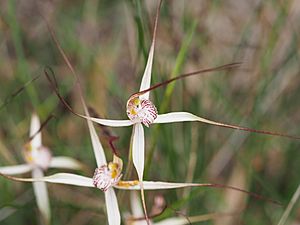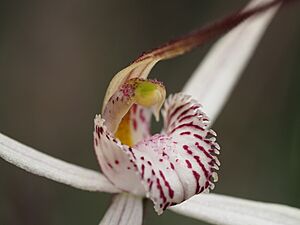Joseph's spider orchid facts for kids
Quick facts for kids Joseph's spider orchid |
|
|---|---|
 |
|
| Caladenia polychroma growing near the Pallinup River | |
| Scientific classification | |
| Genus: |
Caladenia
|
| Species: |
polychroma
|
| Synonyms | |
|
|
The Caladenia polychroma, often called the Joseph's spider orchid, is a special type of orchid. It is found only in the south-west part of Western Australia. This unique plant has a single, upright, hairy leaf. It also grows one or two flowers that are quite large and colorful, but they can have a strong smell.
Contents
What Does It Look Like?
The Joseph's spider orchid is a plant that grows from the ground, not on other plants. It is a perennial plant, meaning it lives for more than two years. It is also a deciduous plant, which means its leaves fall off at certain times of the year. This plant is a herb, which means it has soft stems, not woody ones like a tree.
Plant Structure
Underground, the orchid has a special part called a tuber. This tuber helps the plant store food and often allows it to grow in groups or clumps. Each plant has one leaf that stands straight up. This leaf is hairy and is usually about 70 to 120 millimeters (about 3 to 5 inches) long and about 4 millimeters (about 0.2 inches) wide.
The Flowers
The Joseph's spider orchid usually produces one or two flowers on a stalk that grows 200 to 300 millimeters (about 8 to 12 inches) tall. These flowers are quite large, measuring 100 to 150 millimeters (about 4 to 6 inches) long and 80 to 120 millimeters (about 3 to 5 inches) wide. They can be many different colors, including cream, red, pink, yellow, and white.
Flower Parts
The flowers have long, thin, thread-like parts that hang down. These are called sepals and petals.
- The dorsal sepal stands upright. It is about 45 to 100 millimeters (about 2 to 4 inches) long and 2 to 3 millimeters (about 0.1 inches) wide.
- The lateral sepals are also 45 to 100 millimeters long and 3 to 4 millimeters wide. They curve strongly downwards.
- The petals are similar to the lateral sepals, measuring 45 to 90 millimeters long and 2 to 3 millimeters wide. They are arranged in the same way.
The Labellum
The most interesting part of the flower is the labellum. This is a special lip-like petal that helps attract pollinators. The labellum is about 10 to 17 millimeters (about 0.4 to 0.7 inches) long and 10 to 13 millimeters (about 0.4 to 0.5 inches) wide. It is usually cream-colored or yellow with red lines, spots, and blotches. The sides of the labellum have short, blunt teeth, and its tip is curled underneath. There are also two rows of small, anvil-shaped, cream-colored bumps called calli along the middle of the labellum.
When Does It Bloom?
You can see the Joseph's spider orchid in bloom during the spring months, from September to October.
How It Got Its Name
The scientific name for this orchid, Caladenia polychroma, was first given in 2001. Two scientists, Stephen Hopper and Andrew Phillip Brown, described it after finding a sample near Kendenup. They published their findings in a scientific journal called Nuytsia.
Meaning of the Name
The word polychroma comes from two Ancient Greek words:
- poly, which means "many"
- chroma, which means "colour"
So, the name polychroma refers to the many colors you can see in the flowers of this orchid.
Where It Lives
The Joseph's spider orchid grows in an area between Frankland and the Fitzgerald River National Park. This region includes several different natural areas like the Avon Wheatbelt, Esperance Plains, Jarrah Forest, and Mallee. However, it is most commonly found between the towns of Cranbrook and Kojonup. This orchid likes to grow in places that are wet during certain times of the year, such as near seasonal wetlands and natural drainage channels.
Conservation Status
The Western Australian Government's Department of Parks and Wildlife has classified Caladenia polychroma as "not threatened." This means that currently, there are enough of these orchids in the wild, and they are not at risk of disappearing.


